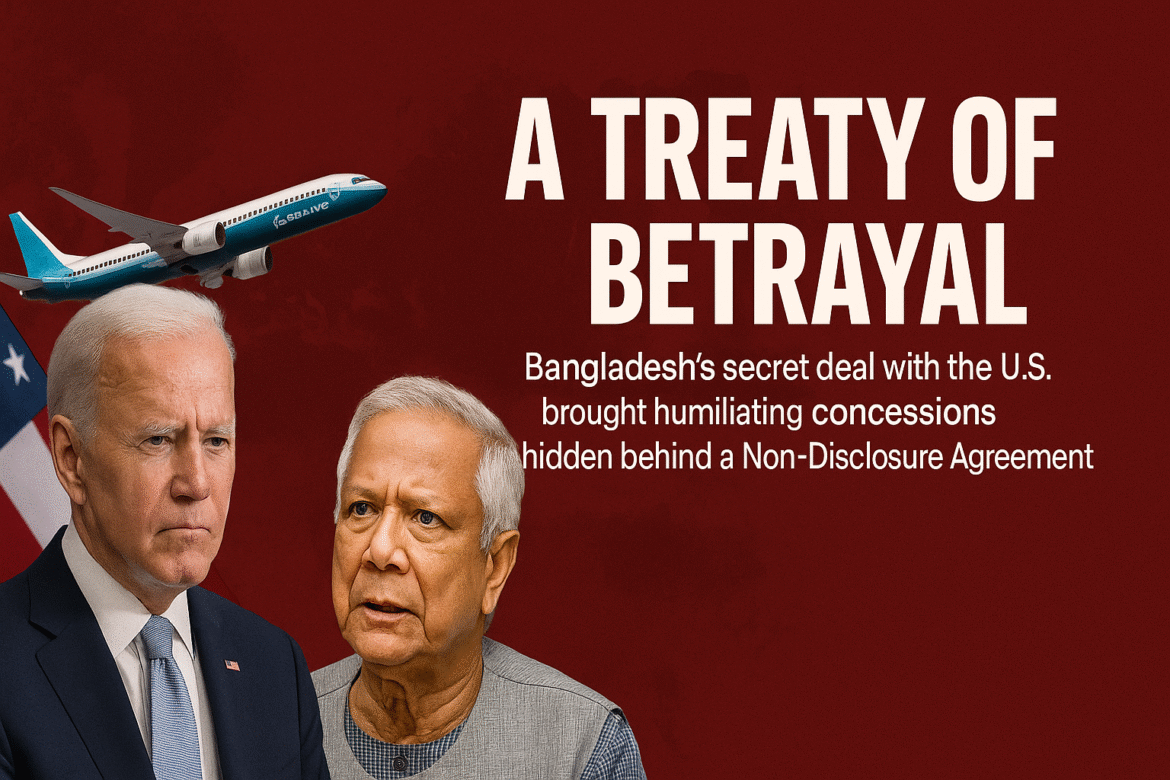By Aminul Hoque Polash
Former Diplomat and Security Analyst
On 31 July, the White House formally revised the reciprocal tariff on Bangladeshi imports to 20%. Initially imposed at 37% in April under Donald Trump’s new reciprocal trade policy—targeting countries with significant trade deficits with the U.S.—Bangladesh’s rate was only reduced after months of frantic lobbying and backdoor negotiations by the country’s unelected, unconstitutional interim government, spearheaded by Nobel Laureate-turned-political opportunist, Dr. Muhammad Yunus.
While this so-called tariff reduction is being paraded as a diplomatic success by the Yunus-led regime, the truth is far more disturbing. The apparent concession came at a devastating cost: Bangladesh was coerced into signing a Non-Disclosure Agreement (NDA) shrouded in secrecy, promising to purchase 25 Boeing aircraft, and commit to long-term imports of American wheat, cotton, and fuel. The public has been kept in the dark. And the result? Even after these humiliating concessions, the effective tariff on Bangladesh’s key export—ready-made garments—has doubled from the previous average of 15% to 35%.
This is not diplomacy. This is daylight extortion.
Despite government claims of triumph, the effective duty on Bangladeshi garments now stands at a staggering 36.5%—surpassing all of our competitors. The interim regime’s attempt to spin this as a ‘15% tariff cut’ is an insult to the intelligence of the Bangladeshi people.
But the tariff itself isn’t even the most scandalous part of this story. The real danger lies in the NDA—crafted and signed in secrecy, beyond the purview of public scrutiny. In exchange for minor economic relief, the illegal regime has sacrificed core sectors of our sovereignty and sold the keys to the republic.
Where are the so-called patriots now? Where are the intellectuals who once roared about national sovereignty? The street agitators, the firebrand economists? Suddenly, they are all silent. Their deafening absence exposes the farce of their past rhetoric.
Let us examine what Bangladesh has truly committed to under this NDA—an agreement so toxic it would have sparked national outrage had it seen the light of day.
Military Surrender Under the Guise of Trade
Perhaps the most alarming element of the agreement is its intrusion into Bangladesh’s defense procurement. While publicly framed as a reduction in military purchases from China, the U.S. has in fact demanded that Bangladesh also halt acquisitions from Russia and Iran. China and Russia currently supplied 90% of our army and navy equipment, and 80% of our air force arsenal. If enforced, this clause would render Bangladesh militarily crippled and strategically exposed, especially as the U.S. offers no equivalent replacement. In other words, our defence strategy has been outsourced—without the consent of Parliament or the people.
Big Pharma’s Trojan Horse
The pharmaceutical industry, one of Bangladesh’s rising export sectors, has also been targeted. The NDA mandates Bangladesh’s blind acceptance of FDA certifications for American drugs and medical devices—while simultaneously dismantling local regulatory barriers that protect consumers and businesses alike. In effect, this clause opens the floodgates to American pharmaceutical domination, threatening the future of a sector that currently exports to over 150 countries.
Shipbuilding Sabotaged
Bangladesh’s emerging shipbuilding industry—now valued at over $1 billion—is being throttled before it can reach maturity. The NDA imposes U.S. standards on a sector where America is barely even a participant. Since the 1970s, the U.S. shipbuilding industry has stagnated, dwarfed by China, South Korea, and Japan—all of whom provide critical technical support to Bangladesh. By forcing adherence to outdated American benchmarks and banning Chinese logistical systems, the NDA effectively sabotages one of our most promising industrial frontiers.
The Hijacking of Agriculture
Even the sacred soil of Bangladesh’s agricultural sector has not been spared. Under the guise of food safety and market access, Bangladesh must now accept all U.S.-produced agricultural goods—without prior approvals. American “halal” certifications, issued by for-profit entities, are to be unconditionally accepted. In return, Bangladeshi farmers are being told to conform to vague American standards. This isn’t trade—this is agricultural colonisation.
Labour Law: A Loaded Weapon
Cloaked in the language of “labour rights,” the NDA introduces deeply destabilising provisions. With only 20% worker consent, unions can now be formed in any factory—including those in Export Processing Zones (EPZs). Factory owners face increased inspections, harsher fines, and the prospect of foreign oversight. While worker protections are vital, these sweeping reforms—imposed externally and implemented rapidly—threaten to paralyse Bangladesh’s most vital industry.
What Lies Beneath: The True Motive of the NDA
Despite official denials, even the government’s own Commerce Advisor, Sheikh Bashiruddin, admitted in a televised interview on 2 July that Boeing purchases weren’t the Americans’ priority. What the U.S. truly sought—and received—were strategic concessions cloaked in the language of trade.
This was never just about garments or tariffs. It was a calculated geopolitical move to lock Bangladesh into America’s orbit, stripping it of its neutral foreign policy stance. The NDA does not merely open markets—it closes doors to sovereignty. It dismantles Bangladesh’s ability to independently determine its military partnerships, industrial strategies, and economic regulations.
The Real Cost of Silence
The most damning indictment of this NDA is not just the content—it’s the conspiracy of silence surrounding it. No public debate. No parliamentary vote. No media scrutiny. An unelected cabal has mortgaged the nation’s future behind closed doors.
This is a textbook case of neocolonialism—brokered not by imperialists with muskets, but by local collaborators in designer suits.
It is no exaggeration to label this NDA a treaty of betrayal. Every clause reeks of capitulation. And yet, the Bangladeshi public—deprived of transparency and leadership—is only now beginning to understand the scale of what has been lost.
Dr. Yunus and his unelected regime have done what no enemy could: they have auctioned off our sovereignty under the cover of diplomacy.
And the worst part? They didn’t even bother to tell us.


